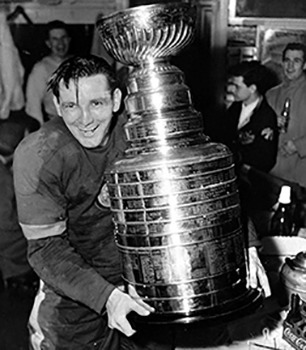On May 15. hockey fans were treated to two great, memorable Game 7 First Round matchups. The New York Rangers defeated the Pittsburgh Penguins 4-3 while the Calgary Flames defeated the Dallas Stars 3-2.
The games were great but what made the night so unique was that both games saw teams advance with sudden-death overtime goals. Moreover, since both games were Game 7 when the games went to overtime, the next goal would win or lose the series with Artemi Panarin scoring the game-winner to allow the Rangers to advance to the Second Round while Johnny Gaudreau’s game-winning goal allowed the Flames to advance.
Related: Little Known Facts About the Stanley Cup
There’s no better ending in all sports than sudden death overtime and the Stanley Cup Playoffs always provide the best, most dramatic endings with some iconic memorable goals. However, a series ending with an overtime winning goal is rare and when they occur, the moments are special, to say the least. How rare are Game 7 overtime winners? Well historically, they are frequent in the Stanley Cup Playoffs but have only happened a few times in the Stanley Cup Final.
The Stanley Cup Game Seven Game Winners
The NHL has played the best of seven Stanley Cup Finals formats since 1939 as part of the incredible 125-year history of the most famous trophy in sports. However, despite the multiple matchups, there have only been 17 Game 7’s, and only two of them have ended with a sudden-death overtime-winning goal.

The first Game 7 game-winner was in the 1950 Stanley Cup Final. The Detroit Red Wings, who interestingly enough advanced to the Final by defeating the Toronto Maple Leafs in a seven-game series with a 1-0 overtime win, faced the Rangers in a back-and-forth series. In Game 7, with Sid Abel scoring his fifth goal of the series to lead all skaters, the score was tied 3-3 and the two teams went to double overtime before the game-winner was scored. Red Wings forward Pete Babando, who only played one season with the team, fired a shot past Rangers goaltender Chuck Rayner for his second goal of the game but more importantly, the goal that ended the game and the series.
The 1950 Stanley Cup Finals were the first to end on a sudden-death overtime winner, but the next time would only come a few years later. The Red Wings faced the Montreal Canadiens in 1954 in a series that went the distance to force a Game 7 at Olympia Stadium. In a 1-1 defensive battle, Red Wings forward Tony Leswick fired a shot at the blue line past Canadiens goaltender Gerry McNeil to score his only goal of the series but notably break the tie and win the Stanley Cup.
Since 1954, the Stanley Cup Final hasn’t been decided by a sudden-death overtime goal, despite multiple Game 7’s and many memorable moments. While Bobby Orr’s flying goal, arguably the most famous goal in NHL history was scored in overtime, the goal was scored in Game 4, allowing the Boston Bruins to complete the sweep to win the Cup. In 1994, the Rangers snapped their 53-year title drought with a dramatic 3-2 win over the Vancouver Canucks where they held the one-goal lead throughout the third and final period of play. Likewise, in 2004, the Lightning held on to a 2-1 lead over the Flames to cliche their first title in franchise history. Even in the 2009 Stanley Cup Final, where the Pittsburgh Penguins defeated the Red Wings 2-1 despite playing the third period without Sidney Crosby, the game-winning goal was scored in the second period by Maxime Talbot.

There’s no better ending than a sudden death game-winning goal but since 1954, the Stanley Cup Final hasn’t been decided with the best possible ending. While it has become a rarity for the Final, there have been a few Game 7 sudden death overtime goals in the Stanley Cup Semifinals that have provided fans with some memorable goals even recently.
Semifinal Game Seven OT Winners
Following the 1954 sudden death game-winner, hockey fans had to wait 14 years until the next series to be decided in sudden death overtime. In the 1968 West Division Final, the St. Louis Blues beat the Minnesota North Stars 2-1 in double overtime behind forward Ron Schock’s first and only goal of the series. While the win was dramatic, it didn’t help the Blues win the Stanley Cup, as they were easily swept by the Canadiens, starting a streak of three consecutive losses in the Stanley Cup Final.
The late 1970s Canadiens are often referred to as one of the best teams in NHL history, winning the Stanley Cup four years in a row led by Hall of Fame players Guy Lafleur, Serge Savard, and Ken Dryden. In 1979, they needed all seven games to defeat the rival Boston Bruins in the Semifinal series featuring a Game 7 that had four third-period goals to tie the game 4-4. In overtime, Yvon Lambert found the puck in front of the net to send the Canadiens to the Stanley Cup Final in front of an ecstatic crowd at the Montreal Forum. The game-winner from Lambert allowed the team to defeat the Rangers in five games to cap off the dynasty.
Many fans know about Mark Messier’s famous guarantee in the 1994 Eastern Conference Finals that the Rangers would win Game 6 to force a Game 7 against the rival New Jersey Devils. However, Game 7 was decided by a rare sudden death overtime winner. In a 1-1 goaltending duel, where Martin Brodeur and Mike Richter combined to make 76 saves, Rangers forward Stephane Matteau skated behind the net and wrapped in the game-winning goal in double overtime.
While many forwards have scored the sudden death game-winners, Brent Seabrook is one of the few defensemen to score a series-clinching goal with his goal in the 2013 Western Conference Final. With the Chicago Blackhawks knotted up at one goal apiece with the Red Wings in Game 7, Seabrook carried the puck into the offensive zone and fired a quick wrister past goaltender Jimmy Howard. The goal sent the Blackhawks to the Stanley Cup Final, where they ultimately defeated the Bruins in six games.

Aside from the Seabrook goal, the only other Semifinal series to end with a sudden-death overtime goal was the Eastern Conference Final in 2017. In a 2-2 Game 7 that went to double overtime between the Penguins and the Ottawa Senators, Chris Kunitz took a quick Crosby pass and sent the puck to the top shelf to end the game and series. The Kunitz goal allowed the Penguins to reach their second consecutive Stanley Cup Final where they ended up defeating the Nashville Predators in six games. Following the 2017 Eastern Conference Final, there was a two-year gap in Game 7 sudden death overtimes where fans would be treated to a surprising number of overtime game-winners.
The 2019 Stanley Cup Playoffs
The 2019 Stanley Cup Playoffs were unusual for a multitude of reasons. The Lightning, who won the Presidents’ Trophy with a 62-16-4 record were swept in the First Round by the Columbus Blue Jackets while the Blues won their first Stanley Cup title in franchise history with one of the greatest midseason turnarounds in sports history. However, one of the unique elements of the 2019 playoffs was that three matchups ended with Game 7 overtime winners, two of which were on back-to-back nights.
The San Jose Sharks already came back from a 3-1 series deficit to force Game 7 against the Vegas Golden Knights but the game itself was one of the most memorable in recent years. Trailing 3-0 in the third period veteran skater Joe Pavelski took a hit that gave the Sharks a five-minute major power play, in which they scored four goals before the game ended up going to overtime tied 4-4. In overtime, Barclay Goodrow sniped the game-winner past Golden Knights goaltender Marc-Andre Fleury to complete the comeback in both the game and series.

The following night, the Carolina Hurricanes faced a Washington Capitals team that was at home and looking to repeat as Stanley Cup Champions. In a 3-3 game that went to double overtime, Justin Williams who was known as “Mr. Game 7“, fired a puck on the net which Brock McGinn redirected to help the Hurricanes pull off the series upset and silence the Capitals crowd in the process. The upset also added to the oddity of the 2019 playoffs with the four top-seeded teams eliminated in the First Round.
After the two First Round sudden death series winners, the Second Round provided an overtime Game 7 that helped propel the winner to the Western Conference Final and eventually win their first Stanley Cup in franchise history. The Blues and Dallas Stars were locked in a 1-1 game that went to double overtime but a Robert Thomas shot sent Stars goaltender Ben Bishop sprawling for the puck, allowing Pat Maroon to tap in the game-winning goal.
The 2020 Bubble (Stars-Avalanche)
Until the 2022 First Round, the most recent sudden death series winner was in the Edmonton bubble in 2020. The Stars and Colorado Avalanche played a back-and-forth Game 7, which appropriately decided a back-and-forth Second Round series. In a 4-4 game, the Stars controlled the puck in the offensive zone and Joel Kiviranta found an open shot in the slot to not only complete a hat trick in the game but end the series.
The optimal ending in the Stanley Cup Playoffs is a game-winning goal in overtime. While overtime winners are common, seeing a series end decided with an overtime winner is a rare occurrence but one that makes playoff hockey special. The intensity, the execution, and the reaction to the goals are what make the game as breathtaking as it is.